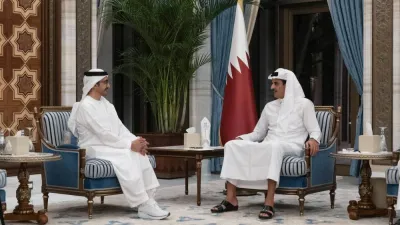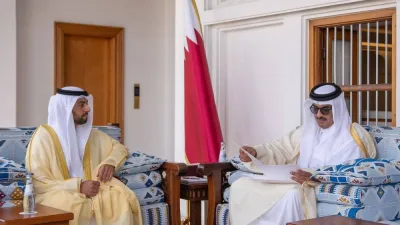Qatar has been closely monitoring the reported detention of Sheikh Abdullah bin Ali al-Thani, who in a video was seen as saying he is being held against his will in the UAE.
Foreign Ministry spokesperson HE Lulua al-Khater told Qatar News Agency (QNA) that Doha was closely monitoring the situation, but due to the total severance of ties with the UAE “it is difficult to clearly establish the circumstances surrounding the situation”.
She said despite that, Qatar principally stands with the protection of rights for every individual and affirms the entitlement of his family to pursue all legal means for the protection of his rights.
“We have seen similar behaviour, in the past, by the siege countries where rights of individuals and officials alike are violated in total contravention of international norms, conventions and laws with no clear purpose or valid reasoning,” she added.
Sheikh Abdullah bin Ali al-Thani, a controversial member of Qatar’s royal family, emerged as an unlikely mediator in August, weeks after Saudi Arabia, the UAE, Bahrain and Egypt cut ties with Doha.
Yesterday Sheikh Abdullah released a video statement, also broadcast by Qatar-based Al Jazeera television, showing him seated in an armchair warning that he was afraid something could happen to him that will be blamed on Qatar.
“I am currently in Abu Dhabi. I was a guest of Sheikh Mohamed. I am no longer a guest; I am a prisoner,” he said in the video, which was widely circulated on social media.
“I want to make clear that the people of Qatar are innocent,” he said. “Sheikh Mohamed bears full responsibility for anything that happens to me.”
“They told me not to leave. I am afraid that anything could happen to me, and the people of Qatar would be blamed. So I just wanted to inform you that if anything happens to me, the people of Qatar are innocent,” added Sheikh Abdullah.
Emirati officials were not immediately available for comment.
In August, Sheikh Abdullah met Saudi King Salman bin Abdulaziz al-Saud and Crown Prince Mohamed bin Salman but Doha was quick to point out that he was in Saudi Arabia on a personal mission and did not represent the government.
Riyadh had tried to present him as someone who opposes His Highness the Emir Sheikh Tamim bin Hamad al-Thani.
Sheikh Abdullah appeared frequently on Saudi and UAE television programmes expressing his views in support of the measures against Doha.
Majed al-Ansari, a professor at Qatar University, said Sheikh Abdullah’s apparent detention could be seen as part of a wider “trend of behaviour” by Saudi Arabia and the UAE in dealing with high-profile Arab personalities that may be used as leverage.
In November, Lebanese officials alleged that Prime Minister Saad al-Hariri was being held hostage by Saudi authorities.
Hariri appeared on television from Saudi Arabia on November 4 to announce his resignation, but retracted it when he returned home.
Riyadh denied detaining Hariri, but the intervention of several countries, including France, led to his release and allowed him to travel two weeks later with his wife while their son and daughter remained in Saudi Arabia.
In a similar situation at the end of November, former Egyptian prime minister Ahmed Shafiq accused Abu Dhabi in a videotape of detaining him and preventing him from travelling, after he expressed his desire to run for president in Egypt.
Abu Dhabi accused Shafik of lying before allowing him to travel alone without his family. He had been living in the UAE since 2012.
“This is now the way that Saudi Arabia and Abu Dhabi deal with their friends,” al-Ansari told Al Jazeera.
Sheikh Abdullah is no more useful to them because their plan to use him to serve their purpose has miserably failed, he added.
Late in the evening, sources quoted Abu Dhabi officials as denying the detention report, saying Sheikh Abdullah was hosted as a guest and he was free to go wherever he wanted to go.

Local


